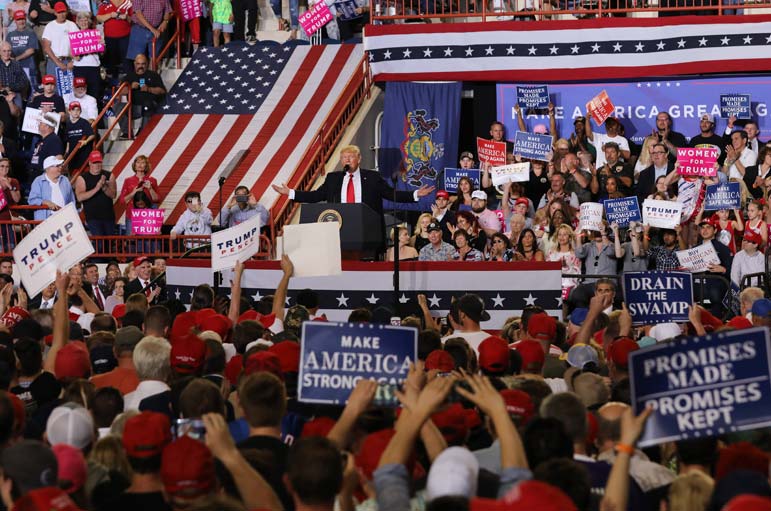 Evelyn Hockstein for The Washington Post
Evelyn Hockstein for The Washington Post
A federal gas tax increase to help pay for upgrading U.S. roads and bridges would fall hardest on states won by Donald Trump in 2016, according to a report released Tuesday by two groups tied to the billionaire Koch brothers that oppose the increase.
The impact of raising the gas tax by 25 cents per gallon, as the U.S. Chamber of Commerce has suggested and Trump reportedly has offered to support, would vary widely from state to state because of differences in the current tax rate and fuel consumption, the report by Americans for Prosperity and by Freedom Partners shows. Of the top 10 states identified by the groups as facing the highest percentage increase in total gas tax liability, Trump won nine.
"Every American stands to lose under this proposal, but some would be more heavily impacted than others," says the report from the two organizations, part of the political network led by Charles and David Koch.
Raising the gas tax is likely to face hurdles in Congress, where many Republicans have expressed reservations. Opposition to the tax increase puts the Koch political network at odds with the Chamber of Commerce -- the nation's largest business lobby -- which supports the move as the fairest and most efficient way to raise more money for U.S. infrastructure needs.
Opposition to the tax increase proposal also potentially puts the Koch affiliated groups in conflict with Trump, who previously has said he's open to raising the levy and last week unveiled a long-awaited plan to generate at least $1.5 trillion in new infrastructure spending.
Proposals to hike the gas tax come as questions grow about where funding for upgrading infrastructure will come from after the Trump administration rolled out a plan that envisions federal funds mostly as seed money to spur states, localities and the private sector to spend the balance of the promised investment.
Trump surprised a bipartisan group of House and Senate committee leaders during a Feb. 14 White House meeting by offering to support a 25-cent increase in the tax on gas and diesel fuel, according to Sen. Tom Carper of Delaware, the top Democrat on the Senate Environment and Public Works Committee. Republicans on Capitol Hill quickly expressed opposition and said prospects for the first boost of the tax in a quarter century appear slim.
The Koch-affiliated groups used data from the U.S. Energy Information Administration, U.S. Census Bureau, American Petroleum Institute and other sources to make their calculations. Their rankings for percent change were based on the state's current total gas levy, including state and federal taxes, compared with the total under the proposed hike.
In raw dollars, the report found that Mississippi would face the largest increase in annual new gas tax burden per household ($391), followed by Wyoming ($380) and South Carolina ($377). Trump won all three.
The report doesn't specifically identify the hardest-hit states as having been won by Trump. But their findings illustrate the impact of a gas tax increase on areas where the president dominated in the 2016 vote.
These are the states facing largest potential percentage increase over current gas tax proposal, according to the two groups: Alaska, 81 percent; Oklahoma, 71 percent; Missouri, 70 percent; Mississippi, New Mexico and Arizona, 67 percent; Texas and Louisiana, 65 percent; and South Carolina and Alabama, 64 percent.
Those with the lowest state taxes would see the largest bump because they're starting from a smaller base. The only state among the top 10 that Trump didn't win is New Mexico.
The chamber has recommended increasing the federal gas tax 5 cents per year during the next five years and indexing it to inflation -- to raise $394 billion over 10 years. The bump would cost an average American about $9 a month more in gas taxes, the chamber said.
The federal per-gallon taxes of 18.4 cents on gasoline and 24.4 cents on diesel were last raised in 1993. Since then, the revenue they generate has declined as inflation has reduced their purchasing power and the average fuel economy of passenger vehicles has increased.


 Contact The Editor
Contact The Editor
 Articles By This Author
Articles By This Author